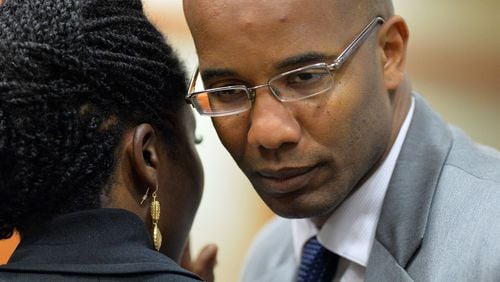Log on to my.AJC.com to read the AJC’s coverage of police shootings in Georgia.
DeKalb County District Attorney Robert James is leading a national trend in Georgia that uses civil grand juries to consider evidence in cases where a police officer shoots and kills a civilian in the line of duty.
Unlike criminal grand juries, civil grand juries can not issue criminal indictments, but James and some other DAs around the country are using them for public guidance as they weigh whether to seek charges against an officer, even in cases where the evidence overwhelmingly supports the officer and his or her justification for pulling the trigger.
“The main reason that we’re doing this is because we want to give the public input,” James said. “We want the process to be transparent and we want the citizens as much as legally possible to have a vote.”
Police officers are rarely charged with a crime when they shoot someone in the line of duty, even in questionable cases where a citizen was unarmed, shot in the back or the shooting ignites a public outcry for justice.
In DeKalb, police have shot and killed at least 22 people since 2010, according to an Atlanta Journal-Constitution/Channel 2 Action News investigation. Two recent fatal shooting cases include those of Kevin Davis who was killed after he dialed 911 for help in December and Anthony Hill, a mentally ill veteran, who was shot in March while naked and unarmed in his apartment complex.
James will take their cases and several others to DeKalb grand jurors in coming months for review as part of a policy shift implemented this spring. James says he will now take every officer-involved shooting before a civil grand jury so that citizens can recommend if his office should seek an indictment with a criminal grand jury.
The first round of cases was presented to a DeKalbcivil grand jury in the March-April term. Grand jurors recommended that James not pursue an indictment in five of the six cases. The grand jurors “strongly” recommended that James move forward with an indictment in the case of Avondale Police Sgt. Lynn Thomas, who shot and killed Jayvis Benjamin in January 2013. James said he would bring the case to a criminal grand jury.
Six more cases have been presented to the current civil grand jury, but the results will not be published until July 2.
If the new policy goes well in officer-involved shooting cases, James said he will bring other police use of force complaints to the civil grand jury as well.
“Often times people are disillusioned and upset because they feel disconnected from the process and that’s what’s going on out there,” he said. “I want to give citizens their say and the only way I can legally do that is through the grand jury.”
Chuck Spahos, executive director of the Prosecuting Attorneys’ Council of Georgia, said DeKalb’s approach reflects a broader trend across Georgia and the country as prosecutors reconsider how officer-involved shooting cases are handled.
He said prosecutors in these cases have traditionally weighed the evidence and then decided whether to pursue an indictment through a criminal grand jury. After a police officer shot and killed teenager Michael Brown in Ferguson, Mo., last year and other recent high profile police violence cases, the public is demanding more accountability.
An officer-involved shooting case in Laurens County is scheduled to go to a civil grand jury this week. And the district attorney’s office in Savannah started using civil grand juries in some cases involving law enforcement.
“It’s becoming a pretty common practice,” Spahos said. “It’s a good way to vet the evidence to the citizens of the county and get their input. The prudent thing to do is present to a civil grand jury and allow the citizens to make a presentment and a recommendation and a true airing of facts.”
In Savannah, District Attorney Meg Heap turned to a civil grand jury after the fatal police shooting of Charles Smith last fall drew public scrutiny. Heap said she had watched unrest in other communities across the country and believed a more open process would help Chatham County avoid those problems.
Smith, who was black, had been handcuffed, but was trying to escape custody when he was fatally shot. After a civil grand jury heard from more than 40 witnesses and listened to days of testimony, the group found the officer was justified in using force. The grand jury’s findings and evidence it heard was made public after it reached the decision. The openess helped build public confidence in the final decision not to prosecute the officer, Heap said.
“People want transparency,” Heap said. “They want to believe their elected officials are doing their jobs. They want an explanation” of the decision. Heap said she plans to use the civil grand jury process in other cases, if warranted.
Unlike the criminal grand jury, the civil process does not require a prosecutor to present the grand jurors with an indictment, which, in some cases, the prosecutor may not think the evidence supports.
In DeKalb, James said he plans to “put everything out there” to help civil grand jurors reach a decision. They will be given access to all the evidence in his files and any witness they want to call. His office is allowing family members of those killed by police to go before the grand jury to tell their side of the story, and he will allow the officer to testify, if they wish.
Kevin Davis’s family plans to go before the grand jury when his case is presented in August. His sister, Delisa Davis, said they want justice for her brother and hope the civil grand jury is the first step.
Davis, who had no criminal history, was killed by a DeKalb Police officer after he called 911 for help on Dec. 29 after his girlfriend had been stabbed by another man.
Officer Joseph Pitts responded to the call. When he arrived at the apartment, he shot and killed Davis’s dog. Thinking his girlfriend’s attacker had returned, Davis grabbed his gun. The officer shot him while Davis was still on the phone with the 911 operator, according to his family.
Delisa Davis said James told the family he is open to listening to all sides and will give the case a thorough look. She hopes the civil grand jury will be the first step in the family’s path to justice.
“I would want them to know that he did not deserve to die the way he did,” she said. “He called 911 for help…I think this officer needs to be held accountable for the murder of my brother.”



/cloudfront-us-east-1.images.arcpublishing.com/ajc/P7DYBH6TO7FEKG4SUXQQKADRXE.jpg)



